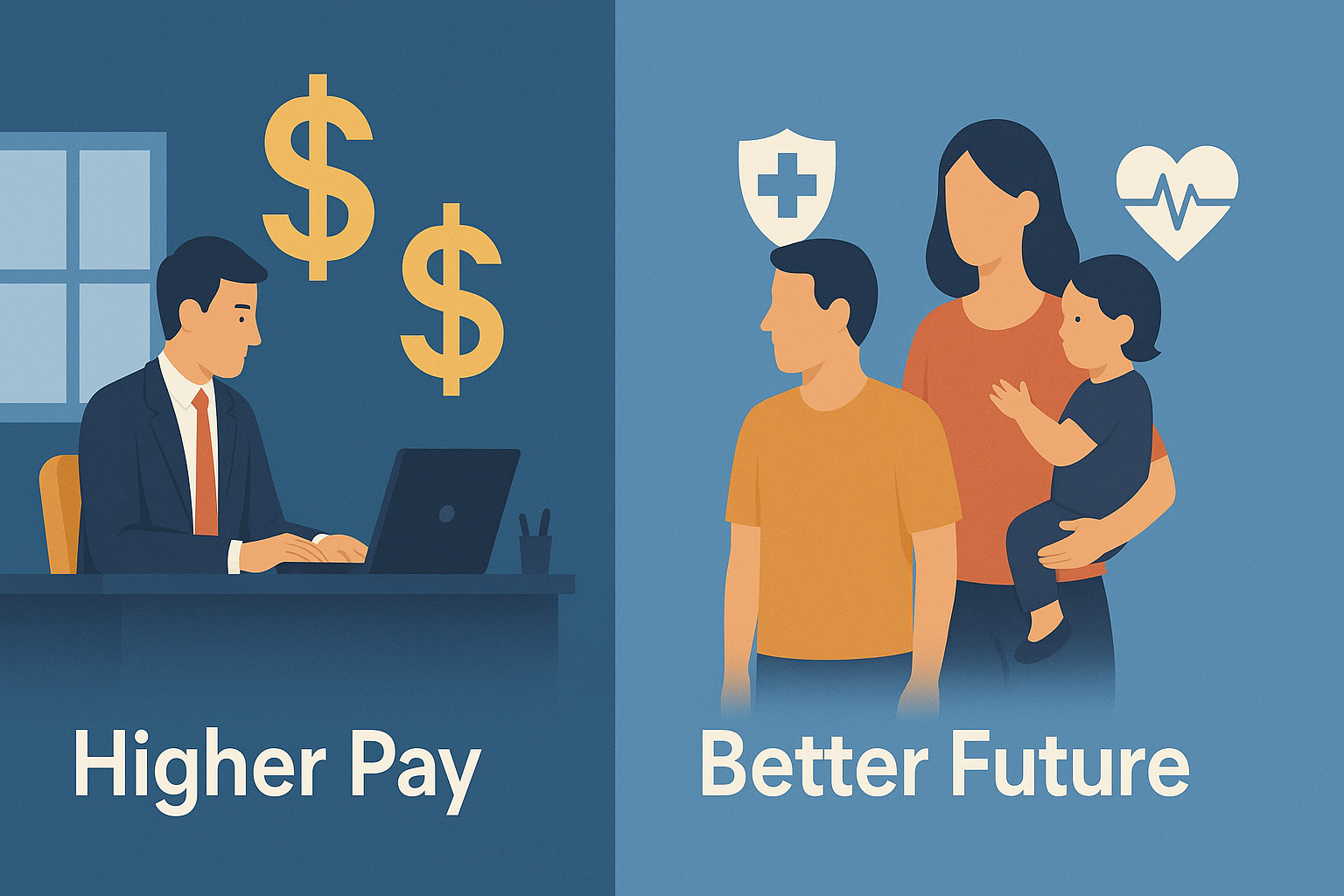Accepting a lower-paying job can feel counterintuitive — especially after years of working hard to increase your income. Yet, in today’s job market, more professionals are discovering that a smaller paycheck doesn’t always mean a smaller payoff.
From better health benefits and flexible schedules to shorter commutes and career-changing opportunities, sometimes the total value of a job offer far exceeds its salary figure. The challenge is knowing when a pay cut makes sense — and when it doesn’t.
Why You Might Consider Accepting a Lower Salary
There are legitimate reasons why taking a pay cut might be a strategic move for your career or personal well-being. Let’s break down the most common — and often misunderstood — ones.
1. When Better Benefits Outweigh the Pay Difference
A salary only tells part of the story. If one employer offers stronger health benefits, retirement matching, or paid time off, those perks can significantly improve your financial picture.
Example:
- Job A pays $95,000 per year but covers 0% of healthcare premiums — costing you about $6,000–$8,000 annually out of pocket for family coverage.
- Job B pays $88,000, but covers 75% of your healthcare premium, provides dental and vision insurance, and contributes 4% to your 401(k).
Even with a lower salary, Job B could leave you financially ahead, especially if it includes other benefits like paid professional development or better PTO.
Tip: When comparing offers, calculate total compensation, not just salary. Include employer-paid benefits, retirement matches, bonuses, and tax savings.
2. When a Shorter Commute Saves Time and Money
Your daily commute can quietly eat away at both your paycheck and your quality of life.
Example:
A 45-minute commute each way adds up to 7.5 hours per week — nearly a full workday spent in traffic. That’s also hundreds of dollars per month in gas, tolls, or transit fares.
If a lower-paying job cuts your commute in half — or offers remote or hybrid flexibility — the financial and emotional savings can be significant. Less time on the road can mean:
- Lower vehicle maintenance and fuel costs
- Fewer childcare expenses
More time for family, hobbies, or rest
In essence, you’re buying back your time, which has real value in terms of well-being and productivity.
3. When Non-Financial Perks Improve Work-Life Balance
Sometimes, the “hidden paycheck” of a job is in its flexibility or culture. Remote work options, flexible scheduling, extra vacation time, or mental health support can transform your day-to-day experience.
For example:
- A $5,000 pay cut may be well worth it if it allows you to work from home three days a week, saving on childcare or commuting.
- A job with unlimited PTO or reduced stress levels might lead to long-term health savings and higher life satisfaction — benefits that no paycheck can replace.
When You Should Not Take the Pay Cut
Despite the potential upsides, there are situations where accepting a lower salary simply doesn’t make sense.
1. If There’s No Clear Career Growth Path
Without mentorship, training, or opportunities for advancement, you may be trading income today for stagnation tomorrow.
2. If You’re Losing More Than You Gain in Benefits
Some employers use “great culture” as a selling point to justify below-market pay. If the tangible benefits don’t balance the drop in income, it’s not worth it.
3. If the Company Is Financially Unstable
Research employer stability and turnover before accepting a pay cut. Promises of “future raises” or “equity potential” mean little if the company struggles to stay afloat.
4. If the Pay Cut Jeopardizes Your Financial Security
Even if the role feels right, a pay cut that strains your ability to pay bills, save, or maintain your lifestyle may lead to stress and resentment over time.
How to Evaluate the Trade-Off
When faced with a lower offer, use this checklist to evaluate total value:
Factor | High Offer | Lower Offer | Difference |
Base Salary | $95,000 | $88,000 | -$7,000 |
Health Insurance (Employer Contribution) | $0 | $6,000 | +$6,000 |
401(k) Match | None | $3,500 | +$3,500 |
Commute Costs | $3,000/year | $500/year | +$2,500 |
Remote Work Flexibility | No | Yes | +$2,000 (estimated) |
Total Net Value | $95,000 | $100,000 equivalent | + $5,000 |
Once you quantify the benefits, you might find that the “lower-paying” job actually delivers more overall value.
Key Takeaways
- Look beyond salary: Health benefits, retirement contributions, and commute savings can close or exceed the pay gap.
- Calculate total value: A “lower” offer might deliver more real-world financial benefit.
- Consider long-term satisfaction: Flexibility, balance, and career growth often pay greater dividends than a few extra thousand dollars upfront.
FAQ
Q: How can I compare job offers fairly?
A: Create a total compensation worksheet that includes salary, benefits, commute costs, and perks. Assign dollar values where possible to see which offer truly pays more overall.
Q: Should I tell the employer I’m comparing benefits?
A: It’s fine to mention that you’re evaluating total compensation holistically — it shows you’re making a thoughtful decision, not just chasing the highest number.
Q: What’s a reasonable pay cut to accept?
A: Generally, up to 10–15% can be justified if the new role offers meaningful benefits or work-life advantages that enhance your overall quality of life.

